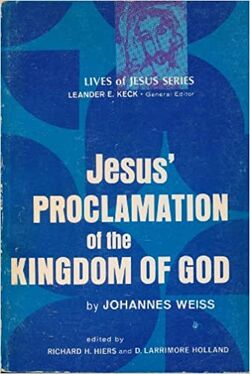Die Predigt Jesu vom Reiche Gottes (Jesus' Proclamation of the Kingdom of God / 1892 Weiss), book
Die Predigt Jesu vom Reiche Gottes (1892) is a book by Johannes Weiss.
Abstract
Against the "Liberal Theology," Weiss argued that the proclamation of the Kingdom of God by Jesus should be interpreted in light of Jewish apocalypticism.
Editions
Published in Göttingen [Germany]: Vandenhoeck & Ruprecht, 1892.
Translations
Table of contents
Excerpts
“Let me now summarize once more the principal results of our study:
1) Jesus’ activity is governed by the strong and unwavering feeling that the messianic time is immanent. Indeed, he even had moments of prophetic vision when he perceived the opposing kingdom of Satan as already overcome and broken. At such moments as these he declared with daring faith that the Kingdom of God had actually already dawned.
2) In general, however, the actualization of the Kingdom of God has yet to take place. In particular, Jesus recognized no preliminary actualization of the rule of God in the form of the new piety of his circle of disciples, as if there were somehow two stages, a preliminary one, and the Kingdom of Completion. In fact, Jesus made no such distinction. The disciples were to pray for the coming of the Kingdom, but men could do nothing to establish it.
3) Not even Jesus can bring, establish, or found the Kingdom of God; only God can do so. God himself must take control. In the meantime, Jesus can only battle against the devil with the power imparted to him by the divine Spirit, and gather a band of followers who, with a new righteousness, with repentance, humility and renunciation, await the Kingdom of God.
4) The messianic consciousness of Jesus consists of the certainty that when God has established the Kingdom, judgment and rule will be transferred to him. God with raise him to the office of “Son of man” (John 3:14), to which he is entitled (John 5:27), and will make him Lord and Messiah (Acts 2:36).
5) Although Jesus initially hoped to live to see the establishment of the Kingdom, he gradually became certain that before this could happen, he must cross death’s threshold, and make his contribution to the establishment of the Kingdom in Israel by his death. After that, he will return upon the clouds of heaven at the establishment of the Kingdom, and do so within the lifetime of the generation which had rejected him. Jesus does not fix the time when this will take place more exactly, since the coming of the Kingdom cannot be determined in advance by observation of signs or calculation.
6) But when it comes, God will destroy this old world which is ruled and spoiled by the devil, and create a new world. Even mankind is to participate in this transformation and become like the angels.
7) At the same time, the Judgment will take place, not only over those who are still alive at the coming of the Son of man, but also over those who will then be raised from the dead, good and evil, Jews and Gentiles alike.
8) The land of Palestine will arise in a new and glorious splendor, forming the center of the new Kingdom. Alien peoples will no longer rule over it, but will come to acknowledge God as Lord. There will be neither sadness nor sin; instead those who are in God’s Kingdom shall behold the living God, and serve him in eternal righteousness, innocence, and bliss.
9) Jesus and his faithful ones will rule over this newborn people of the twelve tribes, which include even the Gentiles.
10) The rule is not suspended by the rule of the Messiah, but thereby actualized, whether it be that they reign together side by side, or that Jesus reigns under the higher sovereignty of God.“
External links
- [ Google Books]

